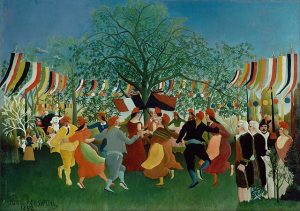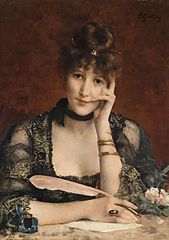I asked on Facebook if anyone wanted a short essay on how to check if something is reliable for the group that it’s attributed to and why it matters to let me know and they did. It was a good thing to write early into my New Year.
Today is when I introduce the wider issue. Over the next year, I’ll focus on specific cultural elements and, gradually, I will introduce cultural relativity, so that anyone following the series can understand the difference between how they see a given culture and what that culture is, in reality. Today, I shall use an Australian Jewish example in honour of the year 5784 and also because what happened in Australia over the last week is a really good introduction to why cultural relatively and precision is important.
What happened in Australia? A major public broadcaster in Australia formally celebrated Jewish New Year only on their Hebrew radio channel, according to their own search engine. SBS has a Yiddish channel (which has a report on antisemitism that I’d love to hear… but my Yiddish is very small, and learned as an adult) and a Hebrew channel that contains most of their publicised Jewish content. These two radio shows are the focus of programming for SBS for those they identify as Jewish Australians.
Programming outside these two radio shows includes the occasional recipe on the food site, news about antisemitism, news about Israel (often showing a worrying bias) and, from time to time, aspects of Jewish history and life as part of regular TV. There is an upcoming series that talks about how a part of Australia nearly became Israel, and has a Jewish presenter (whose father I once made laugh, but that’s another story). A Jewish comedy thing has just been shown, and I’ll get to that in the next paragraph.
The capacity to product culturally fair and supportive material lies within all this, but SBS gets things wrong, almost every time. Late last week, for instance, it advertised a new show with a Jewish theme. “Just in time for New Year!” I thought. I was prepared to admit publicly that I had been entirely wrong in my assessment of SBS.
The show is all about things that happen at, as the promo explains, “a funeral service.” When I looked at the detail about the show, it’s not a funeral service… it’s what SBS thinks is a Jewish funeral service. And it’s a comedy. Programming that includes anything Jewish is rare and special, but a comedy that revolves around death is not appropriate as the sole Jewish offering for the Jewish New Year. It’s the time when we celebrate life and talk about the living future.
What else has SBS done that includes Jewish Australia but also hurts it? SBS had a report on the first Australian cookbook (I’ve written about it elsewhere, Abbott’s heavily plagiarised volume) and mentioned the Jewish recipes… but the presenters had no knowledge that the recipes were all plagiarised from a very famous Sephardi London cookbook. The most crucial aspect of Jewish Australian history represented in the book was missed. This aspect is that Jews have been in Australia since the First Fleet, that nineteenth century Australian Jewish culture was heavily from London ie from an entirely different corner of the Jewish world to current stereotypes, which are mainly American.
I asked SBS themselves about their Jewish programming, a while back. They sent me to the Hebrew radio show. The languages of those two radio shows (Yiddish and Hebrew) support the stereotype that all Jews are sufficiently other that, regardless how long someone’s family has been in Australia (in my case, between 105-158 years), English won’t be their mother tongue. That became a bigger problem when the broadcaster itself sent me to the Hebrew radio show when I asked about Jewish programming. When I asked SBS about why they’d sent me to Hebrew programming, I also asked them if they sent all their Catholics to Latin radio shows. They did not reply.
The whole of the Australian multicultural broadcaster sets up a view of Jewishness that applies only to a minority of Australian Jews. The view does not reach past stereotypes or challenge racism or accept Jews as fully Australian, and they do not know how to culturally focus. They don’t even have a 101 in this: when I looked up “Jewish New Year” in the food section, I found recipes for long, plaited challah. It is not a New Year dish. We eat a round, white challah at this time of year, because we want to have a good and sweet year. This challah is readily available in those supermarkets that stock kosher food, so it’s not that hard to find out about. The problem is not the challah. It’s the conflation of search terms and the assumption that Jewishness is simple and doesn’t need focus.
The lack of focus on what Australian Jewishness is, leaves out the wider Australian community. Most people who rely on SBS and who do not speak Hebrew have no idea that it’s New Year for us. The article in a Canberra newspaper this year was inaccurate, but interviewed a Jewish local leader, so reflected some aspects of Judaism better than the publicly-funded national broadcaster.
Why is this so important? And why do I appear so consumed by it?
I used to advise government bodies on these issues (not just on Jewishness, but how to see and devise sensible government policy for multicultural Australia and its many different communities ie how to get past stereotypes and into reality), but they told me I was not someone they wanted advice from. This was when the Howard government came into power. The Howard government left a legacy that later governments took up. When I worked with SBS (on a different issue, but this subject came up in discussions) they were very aware of issues that they now ignore entirely. Some communities are more visible and have better representation than others. Jewish Australians are now part of the othered groups, and we’re a very good canary in the cultural hate coalmine.
SBS’s lack of understanding is a good template. It demonstrates a wider problem. That lack of focus, of seeing people for who they are, applies to many cultures in novels, in music, in TV, in cinema, in news reports. Given this, the skills I used to teach – how to see outside one’s own cultural boundaries and how to do this respectfully – may be handy again.
I’m going to find some of my old teaching materials, and work, bit by bit through them here, on this blog. I’ll also do interviews of writers, but not as many as I had planned. And this is my New Year promise to you. There will be silly posts, and lazy posts, but there will also be some very useful ones, that take up my past work and update it, and present it to anyone who needs it. It’s not the same as the day-long workshops or than the consultations that are in my past, but if my posts help even one person not create the sort of mess a very well-intentioned public broadcaster has made, a mess that unintentionally supports antisemitism through its support of stereotypes, then that’s a good outcome for a New Year resolution.

 There are 365 days in a year (okay, 366 every four years). And noteworthy things happened on all of them. Births, deaths, assassinations, political coups, technological triumphs, victories for humanity and victories for oppression. Books published, paintings finished, plays debuting, cathedrals built, sculptures completed.
There are 365 days in a year (okay, 366 every four years). And noteworthy things happened on all of them. Births, deaths, assassinations, political coups, technological triumphs, victories for humanity and victories for oppression. Books published, paintings finished, plays debuting, cathedrals built, sculptures completed.